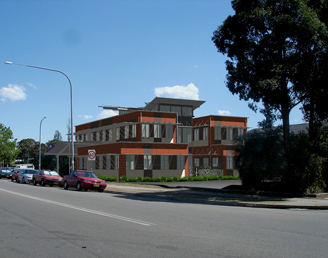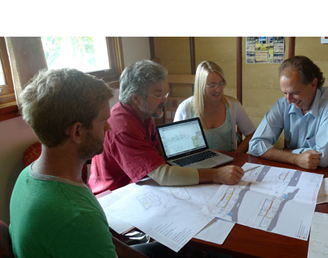Of fish stocks and urban sprawl
Posted by admin on 31/01/2012 at 4:20 amThis week’s news contains two seemingly unrelated stories – urban planning and fish stock management – which together actually point to where things go wrong. But that also means we know where to change things, so they go right. That’d be nice.
The NSW Government is abandoning a leadership role in planning for Sydney’s growth (why do we assume Sydney is under some divine commandment to grow? – it’s just what keeps happening in the absence of any plan to the contrary). Premier O’Farrell and Planning Minister Hazzard have determined that developers should be able to plan the city’s ever-westward expansion, without regard to infrastructure, transport, or nearby employment, and bypass local planning and zoning processes. So what is currently potentially or actually productive farmland may become 10,000 houses, and there is nothing anyone can do about it. Or, from the other perspective, land that you may have an option to buy now has a fast track to profit and there’s nothing those local reactionaries can do about it.
The problem with this is that Australia’s cities are already amongst the most spread-out and least dense in the world, which is a very inefficient way of making them function for transport, community cohesion, and employment. This dysfunction is a financial burden that the whole community pays for ad infinitum. For years the struggle has been to balance the demand for growth (as distinct from the need for growth), and the future demands of sustainability. This is a long running struggle which everybody who keeps half an eye on the news is aware of. In Sydney’s case, previous governments have established two growth corridors, with some form of mass transport at its core (although that is also an on-again off-again story), along and around which the sprawl of detached low density housing was to be clustered.
But today we learn that the O’Farrell mob can’t even stick to this simple discipline – they want anyone with an interest in any parcel of land in any location to be able to nominate it for rezoning directly by the government, bypassing council entirely. Viewed in one way, this can be seen as a policy created by a government absolutely bankrupt of creativity and design discipline. Their excuse is that the current policy “has not worked”. Really? By what definition? I suspect it is more to do with the free market ideology espoused by lobby groups like the Urban Development Institute of Australia, and Urban Taskforce has since joined the chorus. I cannot help wondering if their ultimate vision is for urban sprawl to cover the whole continent: they never speak of limits, they have no long term constraints. Their rhetoric is very strong on “solving the short term problems”. (I note with wry amusement that in pursuit of this goal they will soon run headlong into the jaws on the Minerals Council, who want the whole state – every square meter of it – to be available for mining.)
It is clear to any informed observer that rezoning land based on its profit potential is an extremely poor way to plan a city, and I think that is being kind. The old saying ‘markets make wonderful slaves but poor masters’ is as true as ever.
In world news today we also read of a 90% decline in Southern Ocean jack mackerel stocks over the last 20 years. Fishing companies, often with significant government support and subsidy, have plundered – there really can be no other word – this fishery to the point of collapse in the next year or two. Getting international agreement on such things is like herding cats, similar to the difficult progress on climate change. In climate change, all humanity has a stake and the vested interests fight to hold sway, but in fishery management, vested interests are more dominating and insidious. Direct commercial interference is rife. Governments seem to be mesmerised, in the sway of big fishing companies like PacAndes and Thai Union Group. Never heard of them? They sell a large proportion of the world’s seafood through brands like John West. Companies like these have undue influence on various governments, and thus have stymied efforts to limit fish takes, leading directly to the collapse of the whole food chain. The economic hurt they will suffer through their own short-sighted stupidity has not affected their decision making.
Why is it so hard for governments to adhere to good policy design in the face of pressure from vested interest groups? We see that the same principle is at work in both cases – Sydney’s ‘planning’ (loose use of the term), and protecting the world’s food security. That is a question we should be asking our elected representatives. Claiming a mandate is well and good, but they must remember – or be reminded – that the mandate is from the people, not corporations. We design buildings for the people who will occupy them, governments must also design cities for the people who live and work in them, not for the profits of land owner developers.
Good city planning takes guts as much as anything – once the design, with all its myriad inputs, is in place, you need guts to hold your nerve and say “this is where it will happen, not there.” It seems that the new boss is just the same as the old boss: beholden to the interests of the developer lobby. And Sydney, the Great Unplanned City, suffers onwards and outwards.
We can design the most energy efficient, water-sustainable buildings on earth, but they will never be sustainable unless the urban context that supports them is sustainable too. Is anybody in Macquarie Street currently aware of this? Hullo?
Sustainable House Design
We will help you create a family home that works well, feels good, is kind to the environment, culturally appropriate and reduces your energy and running costs.
Read MoreSustainable Commercial Buildings
We design your building to help reduce your operating costs, optimize the life cycle of your building, increase your property value and increase employee productivity.
Read MoreWorking with Envirotecture
We design beautiful, sustainable buildings that work for you, your family or your business. Full range of building design, consulting and training services.
Read More






















